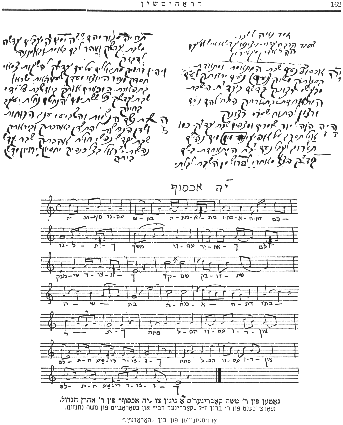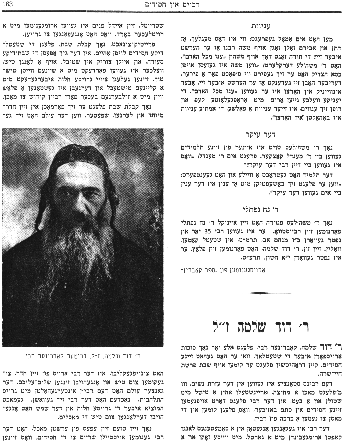
[Page 162]
[The handwritten lines are very difficult to read.]
Notes written by R. Moshe Kobriner to words of a song called Yah Ekhsof [I desire G-d] composed by the great Rebbe Aharon of Karlin. The words were written by R. Baruch, the Kobriner Rebbe, and edited by Moshe Nathanson. From the book, Horodetz.

[Page 163]
Modesty
Someone once asked how it is possible that the opponents of Moses in the desert, Datan and Aviram, could say that Moses was trying to dominate them? The Torah itself says that Moses was the most modest person in the world. R. Moshele said, “When Moses sat on the chair of the tzaddik, he conducted himself like a leader, so they were able to think he was trying to dominate them. However, inside his heart he was the most modest person in the world. People who go around with bowed heads, calling themselves modest, are showing false modesty. True modesty is in the heart.”
The Main Thing
After the death of R. Moshele, one of his disciples went to ask R. Mendel of Kotsk what the main thing was in the life of his teacher, R. Moshele. The student paused a while, and then answered, “Whenever he was involved in something, that 'something' was the main thing.”
R. Noach Naftali
After the death of R. Moshele, his grandson, R. Noach Naftali, took over his role as rebbe. He served as rebbe for 35 years and died on 26 Av, 5649 [August 23, 1889] in the town of Kamen, Volhynia. His son, David Shlomo, took his place, and died on 11 Cheshvan, 5689 [October 25, 1928].
From Sefer Kobrin [Book of Kobrin]
R. David Shlomo
[Photo:] R. David Shlomo, third Kobriner Rebbe
R. David Shlomo, Kobriner Rebbe, used to travel through the towns after the Sukkot holiday to visit his chassidim. He used to come to Drohitchin for the Sabbath of the Genesis Torah portion, Chayei Sarah [the fifth portion after Simchat Torah].
The Rebbe would stay in the synagogue in the women's gallery, where he would have a table, chairs and a bed. He would meet his chassidim and other visitors who came in large numbers to obtain a blessing from the rebbe.
The Rebbe would wear a long velvet coat and a belt, and white socks and a shtreimel [fur hat]. A graying red beard surrounded his refined face. On Friday nights after prayer services, the local chassidim ran home to eat their meal, and then hurry back to the shtibel, where a long table covered with a beautiful white tablecloth, two large challah breads covered over by a small napkin, and a bottle of wine with a silver kiddush cup for the Rebbe.
After the prayer services, he went to study in a room by himself, and later, when the chassidim gathered together, the Rebbe left his room and came to the table to start singing Shalom Aleichem. Everybody joined the Rebbe in singing with tremendous enthusiasm. Then the Rebbe washed his hands and made the blessing over the large challah bread, and the custodian of the shtibel started serving the food.
Previous Page
|
Next Page
JewishGen, Inc. makes no representations regarding the accuracy of
the translation. The reader may wish to refer to the original material
for verification.
JewishGen is not responsible for inaccuracies or omissions in the original work and cannot rewrite or edit the text to correct inaccuracies and/or omissions.
Our mission is to produce a translation of the original work and we cannot verify the accuracy of statements or alter facts cited.
 Drogichin, Belarus
Drogichin, Belarus
 Yizkor Book Project
Yizkor Book Project
 JewishGen Home Page
JewishGen Home Page
Copyright © 1999-2025 by JewishGen, Inc.
Updated 13 Dec 2001 by LA